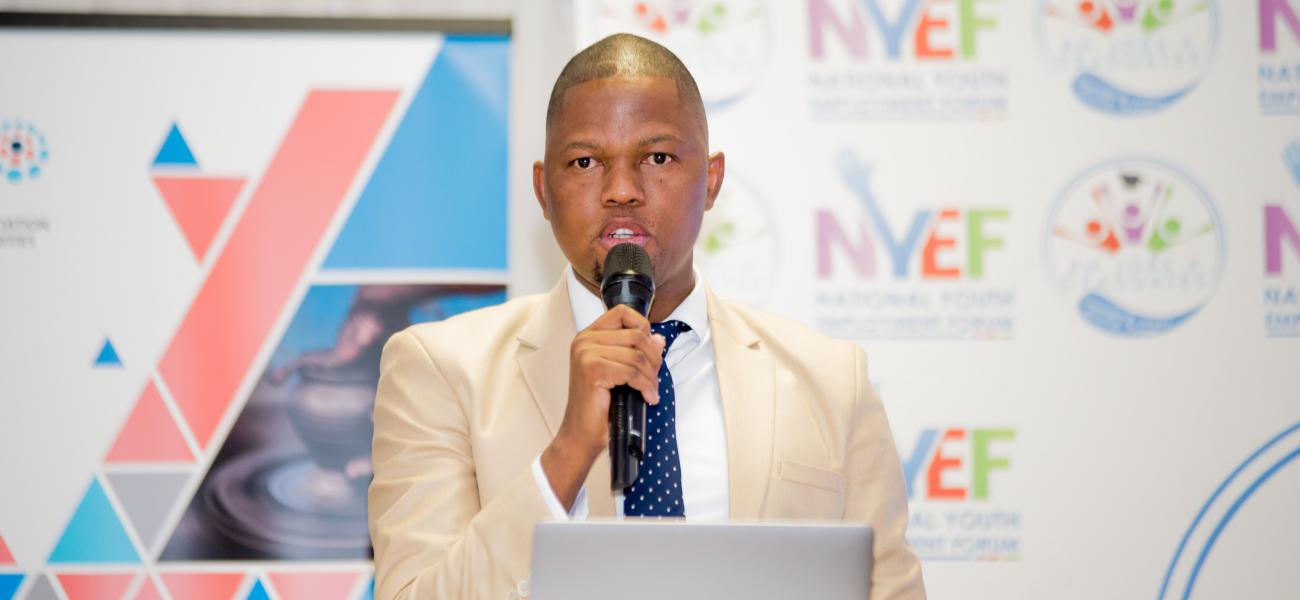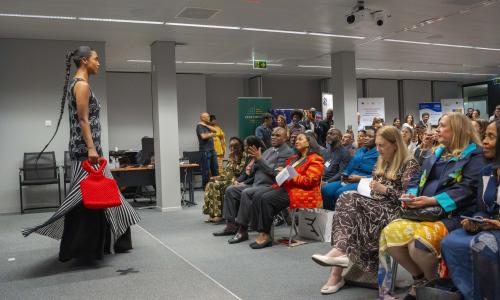Christopher Seagateng is the co-founder and chairperson of BW JOBS 4 GRADUATES and the Deputy Secretary-General of the Pan-African Youth Union. He speaks with Africa Renewal’s Zipporah Musau about his journey into youth leadership, how his organisation is tackling unemployment, and the message he brought to global leaders on behalf of Africa’s next generation:
You have been recognised across Africa for your work in youth empowerment and advocacy—but for readers unfamiliar with your work, how would you describe your journey and what drives your passion for youth development?
Growing up, I was always fascinated by the people who brought change—even in its smallest form. I developed in me a yearning to impact change among my peers, as I started to question uncommon occurrences in my community.
It was inevitable that my career path would lead me to youth empowerment, activism and leadership, where I enjoy bringing out the best from young people while gaining growth from their encounter and personal experience.
Since 2007, I have been in leadership roles, starting as a youth leader at parish level for the Roman Catholic Church. I currently serve as Deputy Secretary-General for the Pan-African Youth Union—an umbrella body that federates all the National Youth Councils and equivalent structures in Africa.
In 2012 while a student, I co-founded a youth led organisation, ‘Botswana Jobs for Graduates’, an NGO that addresses and bridges the high unemployment rate among the youth. Through rigorous engagement with various employers, the organisation now works with over 350 companies that have access to our employment database. Under my leadership of impact-based approach, we have built a membership of with a membership of 600,000 and facilitated employment for over 30,000 young people.
My hunger for change and collaboration with fellow leaders has extended beyond my affiliate organisations. I’ve been involved in national youth development initiatives, including serving from 2015 to 2024 as a board member of the Botswana National Youth Council, where I advised the government on youth-related matters.
Leadership has exposed me to various fields of interest, which has driven me to co-found initiatives sus as the Botswana Youth Jobs Fair, and the Botswana Youth Coalition.
Recognition for my role in youth development includes the Young African Leaders Award (2023), the Mandela Washington Fellow (2019) at Appalachian State University in North Carolina, the Commonwealth Points of Light Award (2019) and the UN Volunteer Champion of the year Award (2019).
Your organisation, BW JOBS 4 GRADUATES, has connected thousands of young people to employment opportunities. What makes this initiative unique, and how are you scaling its impact across the continent?
The initiative took advantage of social media to reach masses of young people using a language they best understood. At the time of inception, all network providers in Botswana offered a version of free Facebook—so there was a lot of traffic and strong reception among young people.
Some of our innovative approaches include:
An all-in-one Interactive Online Platform: where everyone could share job vacancies they come across. Hiring managers interact directly with young job seekers, and young professionals provide mentorship and advice to job seekers. This inspires a vision for a sustainable future where young people can see themselves thriving, occupying space and living their best lives—not always stuck in unemployment.
The Virtual Job Market:Our online platform is facilitating access to customised information about jobs and employment opportunities. More young people now go online to find their next job.
Up-skilling through Job Readiness Program (both in person and online): We help youth bridge the gap between their qualifications and job market demands. This provides opportunities for acquiring the required skills for different positions without the limitation of location and commuting to physical classrooms. So far, over 150 000 young people have gone through our training.
SME Creation and Empowerment: In the absence of available jobs, young job seekers with the help from professionals through our social media channels, have an opportunity to create their own enterprises. We help them acquire entrepreneurial skills.
I have travelled to over 40 countries, representing youth at high-level platforms such as the Summit of the Future; G20 Y20 forum; BRICS Youth Forum, and AU Summit, to share best practices from our work on youth employability in order to influence in shaping policy, and advance social justice through inclusive development.
I have also hosted delegates and officials from other countries in Botswana for impactful platforms like the National Youth Employment Forum and Youth Employment Awards to share on best practices. We are looking to expand our work in the region by the end of 2025.
As one of Africa’s youth voices at the UN’s High-level Political Forum (HLPF) this year, what key message are you bringing to global leaders?
The key message I’m bringing to the global leaders is rooted in the Kampala Declaration, adopted in April, which underscores the critical role of youth as Africa’s most strategic asset for achieving structural transformation, economic diversification, and resilient societies.
African youth are not only the largest demographic group but also the key drivers of sustainable development.
However, we continue to face challenges such as unemployment, under-employment, poverty, violent conflict, and exclusion from policymaking continue to hinder their full participation.
We therefore call for urgent action to create decent jobs, support youth-led innovation and entrepreneurship, and harness science, technology, and digital transformation to build an inclusive future of work—one that responds to climate realities, gender disparities, and urban-rural divides.
Central to my message is the need to reshape education systems and skills development to align with the evolving labour market. Curricula must be modernised to integrate digital literacy, climate adaptation, and critical thinking.
Technical and vocational education should be expanded to provide practical, job-ready skills.
We also emphasise the importance of youth inclusion in governance, calling for formal mechanisms that ensure meaningful participation of young people in national development planning and decision-making processes. Institutionalising youth representation in policymaking and public administration is essential to fostering inclusive and equitable leadership.
Additionally, we advocate for the creation of youth-sensitive social protection systems, including unemployment benefits, health insurance, and childcare support, to safeguard vulnerable young people and promote economic participation, especially among young women and marginalized communities.
What is your message to leaders?
We urge global leaders to invest in partnerships and innovative financing mechanisms that empower youth across Africa. This includes scaling up investments in youth-led startups, establishing a continent-wide youth fund under the African Continental Free Trade Area (AfCFTA), and promoting diaspora engagement to support innovation and job creation.
Climate action must also prioritise youth-led green enterprises, putting green and blue jobs at the heart of national recovery plans. As African youth, we do not ask for permission to lead—we claim our right to shape the present and co-create a dignified, just, and sustainable future for all.
Our message to global leaders is clear: invest in youth, trust our leadership, and ensure our active participation in building the Africa we want and the world we deserve.
Finally, what is your message to young Africans—especially those unemployed and those still in school or college?
This is a defining moment in Africa’s development, marked by major challenges like unemployment, climate change, and geopolitical tensions.
As young people, we hold the key to our solutions. I urge us to use our numbers, our innovation, and our tech-savviness to champion the change we see.
Let’s draw inspiration from our young trailblazers emerging across the continent.
The phones and laptops we carry have become our virtual connectors—let us use them to our advantage.
With the Africa Continental Free Trade Area (AfCFTA) at our doorstep, this is the moment to integrate across the continent and create jobs for ourselves and other young people.







